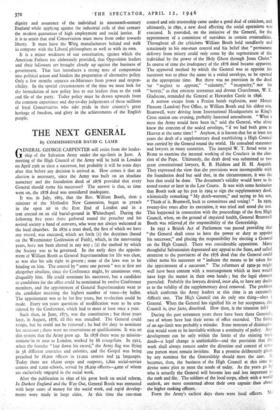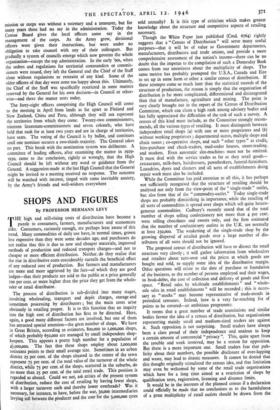THE NEXT GENERAL
By COMMISSIONER DAVID C. LAMB
GENERAL GEORGE CARPENTER will retire from the leader- ship of the Salvation Army under the age-limit in June. A meeting of the High Council of the Army will be held in London on April 25th to elect a successor, but probably it will be some days after that before any decision is arrived at. How comes it that an election is necessary, since the Army was built on an absolute autocracy and the foundation deed of 1878 provided that every General should name his successor? The answer is that, as time went on, the 1878 deed was considered inadequate.
It was in July, 1865, that the Rev. William Booth, then • a minister of the Methodist New Connexion, began to preach in the open air in the East End of London and in a tent erected on an old burial-ground in Whitechapel. During the following five years there gathered round the preacher and his revival society a band of converts, who were not always welcomed in the local churches. In 1870 a trust deed, the first of which we have any record, was executed, which set forth (i) the doctrines (based on the Westminster Confession of Faith), which, in the intervening years, have not been altered in any way ; (2) the method by which the Society was to be governed. In the early days the appoint- ment of William Booth as General Superintendent for life was clear, as was also his sole right to govern ; none of the laws was to be binding on him. The control by " some one person " was at first not altogether absolute, since the Conference might, by unanimous vote, disqualify him. He could nominate his successor, but a candidate or candidates for the office could be nominated by twelve Conference members, and the appointment of General Superintendent went to the candidate receiving the highest number of votes—by ballot. The appointment was to be for five years, but re-election could be made. Every ten years questions of modification were to be con- sidered by the Conference, which had to meet at least once a year.
Such then, in June, 1875, was the constitution ; but three years later, in August, 1878, all this was annulled. The General could resign, but he could not be removed ; he had the duty to nominate his successor ; there were no reservations or qualifications. It was on this system that the Army grew up. In 1878 there were so mission- stations-in or near to London, worked by 88 evangelists. In 1912, when the founder " laid down his sword," the Army flag was flying in 58 different countries and colonies, and the Gospel was being preached by 18,000 officers in 11,00o centres and 34 languages. Today there are 18,000 corps and outposts, 1,800 social-service centres and r,000 schools, served by 28,009 officers-4,000 of whom are exclusively engaged in the social work.
After the publication in 1890 of his great book on social reform, In Darkest England and the Way Out, General Booth was entrusted with large sums of money for the social work, and rapid develop- ments were made in large cities. At - this time the one-man control and sole trusteeship came under a good deal of criticism, and ultimately, in 1891, a new deed affecting the social operations was executed. It provided, on the initiative of the General, for the appointment of a committee of outsiders in certain eventualities. Throughout all the criticisms William Booth held steadfastly and tenaciously to his one-man control and his belief that " permanent delivery from misery could only come by the regeneration of the individual by the power of the Holy Ghost through Jesus Christ." In course of time the inadequacy of the 1878 deed became apparent. The approved method by which the General was to appoint his successor was to place the name in a sealed envelope, to be opened at the appropriate time. But there was no provision in the deed for " neglect to appomt," -" calamity," " incapacity," nor for " heresy," as that eminent statesman and devout Churchman, W. E. Gladstone, reminded the General at Hawarden Castle in 1896.
A narrow escape from a Fenian bomb explosion, near Mount Pleasant (London) Post Office, as William Booth and his eldest son, Bramwell, were driving from International Headquarters to King's Cross station one evening, probably hastened amendment. " What a mess the Army would have been in," said the General, who alone knew the contents of the sealed envelope, " if we had both gone to Heaven at the same time! " Anyhow, it is known that for at least ten years the draft of a supplementary deed establishing a High Counci was carried by the General round the world. He consulted statesmen and lawyers in many countries. The intrepid W. T. Stead went to Rome to, examine the internal working of the Conclave in the elec- tion of the Pope. Ultimately, the draft deed was submitted to two great constitutional lawyers, R. B. Haldane and H. H. Asquith. They expressed the view that .the provisions were incompatible with the foundation deed but said that, in the circumstances, it was the best that could be done. The document's validity would have to be tested sooner or later in the Law Courts. It was with some hesitation that Booth took up his pen in 1904 to sign the supplementary deed, whimsically remarking "My death-warrant," and saying to his son, " Think of it, Bramwell, back to committees and voting! " In 1929, twenty-five years after its execution, it was tried and stood the test. This happened in connection with the proceedings of the first High Council, when, on the ground of impaired health, General Bramwell Booth was relieved of the responsibility of the Generalship.
In 1931 a British Act of Parliament was passed providing that " the General shall cease to have the power or duty to appoint his successor," and placing the responsibility for electing a General on the High Council. There was considerable opposition. Many thoughtful Salvationists deprecated any appeal to the State, and called attention to the provisicns of the 1878 deed that the General could either name his successor or " indicate the means to be taken for the appointment of a successor." The .reformers of 1929-30 might well have been content with a rearrangement which at least would have kept the matter in their own hands ; but the legal element prevailed. Probably the lawyers desired, inter alia, to have any doubt as to the validity of the supplementary deed removed. The problem which confronts the Army leaders at this time is an extremely difficult one. The High Council can do only one thing—elect a General. When the General has signified his or her acceptance, the Council is, ipso facto, dissolved. How then, is the situation left?
During the past seventeen years there have been three Generals, two of whom have had their terms of office extended. The fixing of an age-limit was probably a mistake. Some measure of would seem to be inevitable without a continuity of policy. Any development can be only within the limits of the existing trust deeds—a legal change is unthinkable—and the provision that the work shall always remain under the direction and control of some one person must remain inviolate. But a promise deliberately given by any nominee for the Generalship should meet the case. It becomes, then, the business of the High Council at this time to devise some plan to meet the needs of today. As the years go by who is actually the General will become less and less important to the rank and file. The soldiers of the local corps, albeit with a -world outlook, are more concerned about their own captain than about the higher ranking officers:
From the Army's earliest days there were local officers. No mission or corps was without a secretary and a treasurer, but for many years these had no say in the administration. Today the Census Board gives the local officers some say in the management of the corps. As the Army grew, divisional officers were given their instructions, but were under no obligation to take counsel with any of their colleagues. But gradually a system of councils emerge which now governs the whole organisation—except the top administration. In the early '9os, when the orders and regulations for territorial commanders or commis- sioners were issued, they left the General and the Chief of the Staff alone without regulations or restraint of any kind. Some of the older officers of that day were none too happy about this. Ultimately, the Chief of the Staff was specifically restricted in some matters reserved by the General for his own decision—in Council or other- wise—and there the matter rests today.
The forty-eight officers comprising the High Council will come to the meeting in April from lands as far apart as Finland and New Zealand, China and Peru, although they will not represent the territories from which they come. Twenty-two commissioners, nineteen lieutenant-commissioners and seven colonels, who have held that rank for at least two years and are in charge of territories, have seats. The voting of the Council is by ballot, and continues until one nominee secures a two-thirds majority. The General takes no part. This break with the nomination system was deliberate. A committee of leading officers, after examining the matter in 1929- 1930, came to the conclusion, rightly or wrongly, that the High Council should be left without any word or guidance from the General. A suggestion made at the last High Council that the General might be invited to a meeting received no response. The outcome will be watched with interest, tinged with some inevitable anxiety, by the Army's friends and well-wishers everywhere



























 Previous page
Previous page